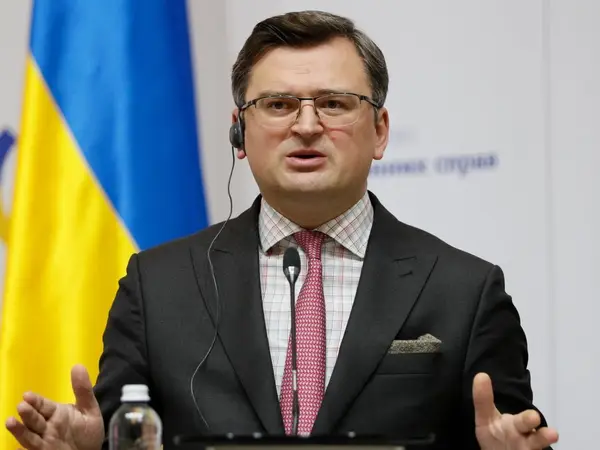Foreign Minister Dmytro Kuleba said Tuesday he had called on President Volodymyr Zelenskyy to break off Ukraine’s diplomatic relations with Iran.
Kuleba said Kyiv was willing to share a “bag of evidence” with the European Union that Russia had used Iranian-made military drones in the current conflict. The EU is currently considering sanctions against Iran should the Ukrainian claims be proved.
Russia used dozens of ‘kamikaze’ drones in attacks Monday that Ukraine says were Shahed-136s, killing four people in Kyiv. “Tehran bears full responsibility for the destruction of relations with Ukraine”, Kuleba told a news conference.
While Iran has denied supplying drones to Russia, analysts point out they could be a cheap if less effective alternative to Russia’s diminishing stocks of missiles. The State Department’s Vedant Patel Monday backed up Ukraine’s claims, saying there was “extensive proof” Russia was using Iranian-made drones.
Iran has been a close military ally of Russia in the Syrian war, where Moscow supplies air power and Tehran tens of thousands of militia ground troops to defeat the opponents of Bashar al Assad's government.
Iran's Supreme Leader Ali Khamenei also backed Vladimir Putin in July by praising the Russian leader's "initiative in in invading Ukraine.
‘Pressure on Israel’
In his press conference, Kuleba also said Kyiv would send an official note to Israel seeking military aid including air defense supplies. Disappointed at Israel’s refusal to supply weapons, Ukrainian officials have sought to highlight Iran’s relationship with Russia.
Ukraine and Iran have maintained diplomatic relations despite disagreements and an exchange of sharp language over the January 2020 shooting down by Iranian air defenses of a Ukrainian passenger plane, killing all 176 aboard, during heighted US-Iran tensions.
In an analysis Tuesday, the New York Times argued that a Tehran-Moscow “alliance” was “raising the pressure on Israel, Iran’s sworn enemy, to take Ukraine’s side in the war.”
On Sunday Nachman Shai, Israel’s Minister for Diaspora Affairs, argued for sending military aid to Kyiv on top of existing humanitarian relief. But Tuesday, before Kuleba’s remarks, Justice Minister Gideon Saar, who sits on Israel’s decision-making security cabinet, told national broadcaster Army Radio that Israel’s support for Kyiv “does not include weapons systems and weaponry - and there is no change to that position.”
‘Reckless’ supply
Dmitri Medvedev, deputy head of Russia’s Security Council, warned Monday that “reckless” supply of Israeli hardware would “destroy all interstate relations between our countries.” Around 15 percent of voters in Israel, where there is a general election November 1, are Russian-speakers. Israel has also had intelligence coordination with Russia in Syria, where both air-forces have operated during the decade-long conflict.
Ukraine has been successful gaining military aid from the European Union, whose foreign ministers’ meeting in Luxemburg Kuleba addressed virtually Tuesday “from the bomb shelter.” The foreign minister tweeted that he had asked the Europeans for “more air defense and ammunition” and for “sanctions against Iran for supplying the Russian Federation with drones.” The EU announced Tuesday a further €500-million ($492 million) military supplies to Ukraine, bringing the total to €3.1 billion ($3.01 billion). United States support is around $17 billion so far.
